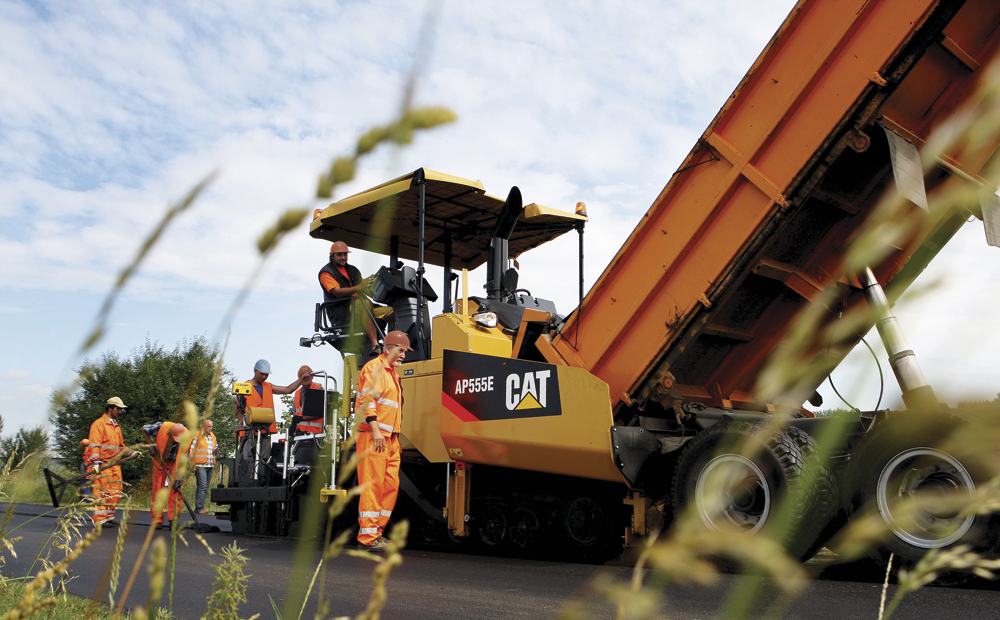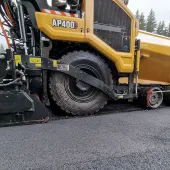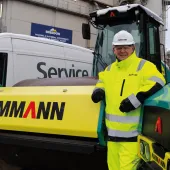Rapid Paving

USK Mlada Boleslav choose a Cat AP555E asphalt paver for a demanding rural road project in the Czech Republic
The rural roads near Brandys nad Labem, in the heart of the Czech Republic, may not be as heavily travelled as their counterparts in Prague, about 15.5 miles to the south-west, but they are nevertheless crucial arteries to the rural and agricultural areas of the country.
An assessment by regional authorities indicated that these roads were in need of major repairs, which has led to cold planning and paving work on a series of rural roads near Brandys nad Labem.
Regional authorities identified two main requirements: first, the roads had to stay open during the work because many are the only viable transport option; and secondly, the work had to be completed quickly (five days for one particular stretch of road) to allow usual traffic patterns to resume as soon as possible.
USK, headquartered in Mlada Boleslav, were hired to handle the regional road project. According to Ing Jan Horak, the company’s chief executive, a key aspect of the contract was transferring both the knowledge and equipment often used in urban settings to the rural project.
Brandys nad Labem-Stara Boleslav is a town located near the regional road network. With a population of around 15,000, it retains a rural feel despite its close proximity to Prague. Smaller roads reach out from Brandys nad Labem-Stara Boleslav to the rural areas, and this is where repair works took place.
Challenges
The new highway section, which took five days to complete, is 2.6 miles long and 6m wide. Since half the road was required to remain usable, USK Mlada Boleslav needed a paver capable of working at a width of 3m. Also, this paver had to be capable of laying down 800 tonnes of asphalt per day for five days in order to achieve production levels required.
A Caterpillar AP555E asphalt paver was, therefore, assigned to carry out the paving job. The open road meant the crew, particularly operators, had to be aware of traffic. The paver’s platform helped address this issue, as the seats can easily be turned for better visibility. The dual control stations also allowed operators to switch seats without taking their eyes off the important work at hand.
The ability to work from either side of the operating platform on the AP555E ensured the paving train worked at a quick pace, as did the grip of the Mobil-Trac system. ‘The tracks grip the surface and thus provide both excellent manoeuvrability and speed that lead to high quality and pace,’ explained Jiri Siroky, sales manager of road technology for Phoenix-Zeppelin, the local Cat dealers. ‘The Cat AP555E track paver easily moves over soft base materials and the operator simply manoeuvres it during paving.’
The road crew worked at a rate of up to 8m/min, consistently reaching the high end of the production target. This was a very quick pace considering the mat thickness of 50mm and the requirement that all elements – trucking, paving and compaction – be synchronized.
The Cat AP555E proved to be highly efficient on the rural road project, working for a half day in a single direction and then returning to the starting point and laying down the second half of the road with a longitudinal joint. According to Caterpillar, while the travelling speed of other machines with tracked undercarriages is 2.5 miles/h, the medium class AP555E paver can travel up to four times quicker.
‘Faster travelling speed means fewer delays during work, which, in turn, is reflected in reduced time needed to complete the job,’ said Mr Siroky. In addition, the paver’s 190-litre fuel tank helped eliminate the need for frequent refuelling and minimized work delays.
Ing Jan Horak added: ‘We only had to refuel every second day. It’s a very important advantage. With the old paver, which was from a different manufacturer we had to refuel every day.’
Planning for production
Planning played a key role on the paving contract. USK Mlada Boleslav focused on material supplies and accurately counting truck loads to ensure consistent delivery of asphalt. The steady delivery allowed machines to move consistently – a crucial step in ‘segregation prevention’.
Each haul truck, with a capacity of 30 tonnes, had to travel 25 miles from the plant to the job site. A round trip took around 90min to 2h, equating to four round trips per truck per day. USK Mlada Boleslav calculated it needed six trucks to keep the paver moving steadily. The mix consisted of a stone size of 4-8mm which arrived at a temperature of 160°C and was placed at 145°C. The material was end-dumped into the paver.
A number of precautions were taken to prevent segregation. Loads were covered at the plant to maintain temperature, while special focus on the trucking pattern ensured the mix arrived at correct temperatures. Four independent sensors on the spreader augers and conveyors provided the right amount of material to an AS4252C screed which was electrically heated to help keep the temperature of the mix consistent.
Specified compaction values were achieved with vibrating tampers on the paver’s smoothing bar, followed by compaction with a Cat CB534D vibration roller weighing 12 tonnes. The project was completed on time, and surface smoothness and quality goals were successfully met.








